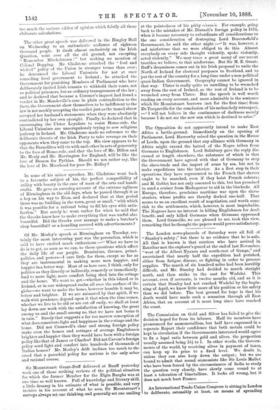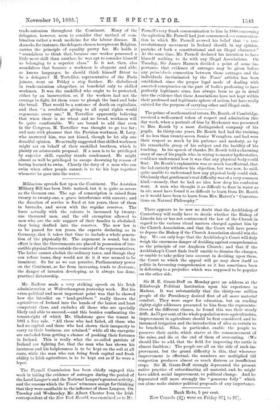An International Trade-Union Congress is sitting in London to deliberate,
ostensibly at least, on means of spreading trade-unionism throughout the Continent. Many of the delegates, however, seem to consider that method of com- bination rather a weak medicine for the labour disease. M. Anseele, for instance, the delegate chosen to represent Belgium, carries the principle of equality pretty far. He holds it " scandalous to think that, because one worker possessed a little more skill than another, he was apt to consider himself as belonging to a superior class." Is it not, then, also scandalous that because a workman is eloquent and able, or knows languages, he should think himself fittest to be a delegate ? M. Tortellier, representative of the Paris joiners, went on Friday a step further. He disbelieved in trade-unionism altogether, as beneficial only to skilled workmen. It was the unskilled who ought to be protected, either by an insurrection, or, if the workers had not the courage to fight, let them cease to plough the land and bake the bread. That would be a sentence of death on capitalists, and then "a. revolution giving to all equal rights would regenerate every one," M. Tortellier apparently believing that when there is no wheat and no bread, workmen will be quite comfortable. We are bound to add that even in the Congress, M. Tortellier was thought to go too far ; and note with pleasure that the Parisian workman, M. Lavy, who answered him, was not hissed, though he let slip one dreadful opinion. He actually suggested that skilled workmen might act on behalf of their unskilled brethren, which is plainly an aristocratic proposal. If a man is to be privileged by superior skill, equality stands condemned. He might almost as well be privileged to escape drowning by reason of having learned to swim. Clearly the duty of a man who can swim when other people cannot, is to tie his legs together whenever he goes into the water.







































 Previous page
Previous page